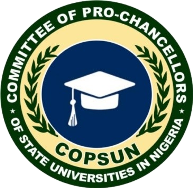The 2-day conference, organized under the theme – “Current Challenges Facing State Universities and the Way forward” – was declared open by Mrs. Modupe Mujota, the Hon. Commissioner for Education, Science and Technology, on behalf of Senator Ibikunle Amosun, the Executive Governor of Ogun State. The conference was attended by 17 Pro-Chancellors, 6 Vice-Chancellors from State and Private Universities, 3 Provosts of Colleges of Education, 2 Rectors of Polytechnics, representatives of the Ogun State Ministry for Education, Science and Technology, Deans of Faculties, and representatives of university staff unions.
Also present and presenting thought-provoking goodwill messages wereMr. Segun Jeboda, representing the Executive Secretary of the Tertiary Education Trust Fund, and Prof. Mike Faborode, the Executive Secretary of the Committee of Vice-Chancellors. Prof. Patrick Aina, representing the Executive Secretary of NUC presented the Keynote Address.Ten specially invited resource persons presented well-researchedand discussed papers under the three sub-themes of the conference. Presented below are the highlights of the outcome of the conference.
- COPSUN expressed concern forthe current challenges being faced by State universities and the resulting negative impact on the quality of products of the system.
- The identified challenges facing state universities in Nigeria include:
- Acute underfunding
- The disconnect between the curriculum and the demand and realities of our economy
- Graduateunemployment and employability
- Institutional instability leading to unstable academic calendar
- Political interference in the university governance
- Erosion of autonomy
- Poor infrastructural and research facilities
- Inadequate staffing especially of academic staff
- Weak linkages between universities and industries
- Overbearing control ofcurriculumin our universitiesby regulatory bodies and its negative impact on institutional innovation in programme development and offerings.
- State universities have their peculiar characteristicswhich in themselves constitute problems. Such characteristics include heavy reliance on government funding, overblown non-teaching staff, government control and policy imposition, escalating operational cost, erosion of principal officers’ functions, overcrowding and deterioration of facilities, and non-compliance with institutional statutes and procedures governing the operation of individual universities.
- COPSUN agreed that if the state universities are to sustainably achieve their objectives, the following strategies should be adopted and pursued:
- Ensuring quality through capacity building and the deployment of technology to academic and administrative functions.
- Thinking outsidethe box by employing workable strategies to overcome some of these challenges such as thedual mode – academic degree combined with vocational certificate – requirement for graduation as espoused by TASUED.
- Adopting good and result-orientedgovernance system that promotes accountability, participation and transparency.
- Institutionalization of realistic annualbudgeting coupled with a judicious management of resources and monitoring of budget performance.
- Partnering with private sector, individuals and alumnito attract gifts, endowments and other forms of support.
- Ensuring institutional autonomy and open administration.
- Embarking on fund generation activities – internal and external.
- Promoting a stronger industry-university collaboration
- Ensuring quality and relevance of programmes to societal needs.
- Promoting dialogue between the Pro-Chancellors of State Universitiesand the National Universities Commission (NUC) towards the evolution of joint actionto address the peculiar challenges being faced by state universities.
- Developing and delivering programmes that address the needs of the economy
- Because many of the identified challengeshave to do with funding,CPSUN proffered the following steps towards alleviating the problem of dwindling financial resources:
-
- Ensuring proper manning of staff positions in the institution.
- Putting in place institutional framework for the administration and optimal management of resource inflow and outflow.
- Stepping up internal revenue generation through, among others:
- incorporating vocational studies in the curriculum while providing a platform for students to engage in revenue-yielding commercial activities;
- Establishing commercial activities and consultancy services that include staff and students;
- Attracting research grants; and
- Commercialisation of research results.
- Strengthening institutional internal and externallinkages and partnerships.
- Provision and maintenance of ICT and other infrastructural facilities to support academic, administrative and commercial activities.
-
- COPSUN agreed that state universities cannotoperateeffectively without charging appropriate tuition and other fees towards the recovery of cost of provision of quality programmes. CPSUN therefore expressed serious concern over state governments’ currentimposition of feesdriven mainly by political consideration.CPSUN decided to make a special appeal to our State governments to re-consider the current policy on tuition fees for mutual benefits to achieve sustainable operation of our universities.
- COPSUN agreed that council members should protect the sanctity and autonomy of the university system.The on-going controversy on the conduct of Post-UTUME is unnecessary since the power to set the conditions and requirements for admissions of candidates to our universities is vested in the Senate of each university.
In conclusion, the Conference agreed that, in line with global economic reality and Nigeria’s economic downturn, in particular, state universities should intensify internal revenue generation, ensure proper management of both human and material resources and re-engineer university education to meet current realities.On the other hand, State governments should,towards this end, provide realistic and guaranteed funding support while evolving policies that promote sustainable operation of our universities.

